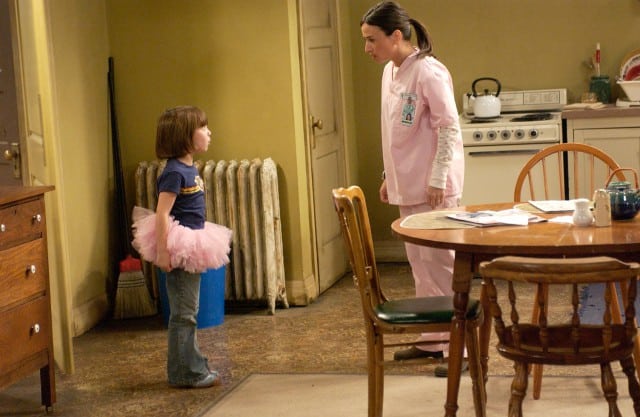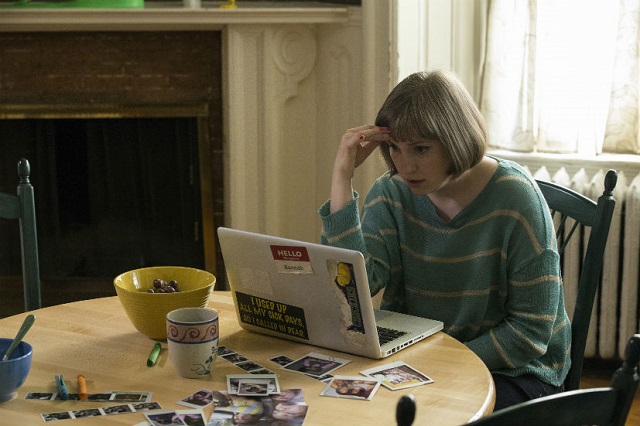Lucky Louie, Season 1, Episode 13, “Clown Time is Over”
Written by Jon Ross
Directed by Andrew D. Weyman
Unaired, Released with Season 1 DVD
Much of the first and only season of Lucky Louie doesn’t work due to jokes at the expense of underprivileged people of all kinds. From women to people of color to those struggling with addiction, the series often feels like it is playing Whack-a-Mole with different groups at whom it can punch down. That being said, its final completed episode, “Clown Time is Over” (which went unaired during its initial run), fails for a different reason—its jokes are simply dull.
It starts with one of the show’s few cold opens that directly relates to the rest of the episode. While the narrative cohesion is a nice touch, the lack of funny or surprising jokes is not. From the moment writer Jon Ross establishes that the clown isn’t coming, it’s blatantly obvious that Louie will be asked to serve in his place. The whole point of the show has been to riff on established sitcom tropes, but this one feels so tired and recycled that it’s hard to see the point of bringing it back. Although Lucky Louie often fails when trying to tackle “edgy” topics, due to approaching them with a mentality which couldn’t be more retrograde, those moments at least suggest some sort of point to the show’s concept. But in simply using a familiar story without much contemporary revision (minus a bit of vulgarity here and there, but hardly enough to constitute a radically updated approach), “Clown Time is Over” doesn’t do much to justify its existence.
Accordingly, the arc goes exactly where one would expect (until it doesn’t, and too much so, but more on that in a bit). Louie dresses up in pizza boxes, balloons, and pantyhose, and he becomes the entertainment at Lucy’s party. “Clown Time is Over” seems to be depending on some inherent humor in this concept, or in Louie’s costume, but neither is there, and the scene is utterly flat as a result. Jerry’s laughter is one of the scene’s few bright moments, and he suggests what could’ve been a possible fix for the show as a whole—more reliance on him. True, he doesn’t have much depth as a character, but he is one of Lucky Louie’s few wholly original creations, making for one of its bright spots. Unlike Rich, the show’s other laughable idiot, his jokes don’t come at anyone’s expense and his bits are almost always enjoyable. But “Clown Time is Over” keeps its focus on its titular arc, bogging the episode down and keeping it too predictable to be funny.

The arc then finds Louie pursuing freelance work as a clown, which, again, just isn’t a funny enough concept to have much weight. “Clown Time is Over” at least has the decency not to repeat the image of Louie performing in front of a group of kids, but hearing him tell Kim about it doesn’t work much better. The scene also finds Lucky Louie once again resorting to tasteless humor, as Louie likens his experience to getting raped. These kind of jokes have plagued Lucky Louie from its pilot, and they’re all the more painful when they’re used in service of a concept that doesn’t have much potential, and feels redundant even without them.
By contrast, “Clown Time is Over” does get unpredictable in its B plot, but to the point where it relies on character inconsistencies and situations too absurd to work. Last week’s review complained about Lucky Louie making Kim into too archetypical of a “good woman” character, depicting her as an innocent nurse who just wants to read and eat salad, in contrast to her boorish husband, who loves action movies and bacon cheeseburgers. But this week, Ross takes her in the opposite direction, presenting her as a vulgar firebrand who offends her fellow mothers and isn’t shy about fighting her daughter’s dance teacher. Both of these depictions are too broad to yield much humor, but choosing one of them could have at least brought some consistency to the character. Instead, she’s caught between the two archetypes, and the result is that Lucky Louie fails to give her depth of any sort.
A lLack of depth is a larger problem with the show as a whole. While Louis C.K. seems to have created it from a decent concept, he doesn’t do enough with the idea to bring it beyond being simply that. Worse, the show consistently drags down any potential it has with cheap and tasteless jokes. TL;DR: It’s not hard to see why Lucky Louie only got one season.






